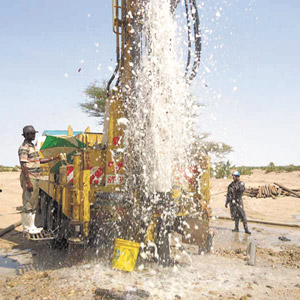I recently wrote a post on the National Driller website about a huge find in Kenya. A company called Radar Technologies used satellite imaging to guide drillers to a massive aquifer in the country’s arid north.
The Lotikipi Basin Aquifer measures about 41 miles by 62 miles. It has a storage capacity of 207.5 billion cubic meters and recharges at about 1.2 billion cubic meters a year. For context, imagine finding an underground lake the size of Rhode Island.
“Massive” understates the impact this find could have on the country. Kenya has 44 million people, and more than 40 percent of those people lack reliable access to clean, potable water. By some estimates, this increases the country’s strategic water reserves by 900 percent. Think about that. You’re on a fixed income and barely scraping together enough to pay bills, let alone thrive. That was yesterday. Today, you have nine times that fixed income. Paying those bills, feeding yourself and your kids, and even putting some away for the future turn into real possibilities.

|
|
Drillers confirmed the location and breadth of the Lotikipi Basin Aquifer after satellite images showed them where to look. It increases Kenya’s strategic water resources by a factor of nine. Source: UNESCO Nairobi Office |
Curse of the Lottery
We’ve likely all seen those TV shows about how a winning lottery ticket ruined someone’s life. We all think, “That poor schmuck couldn’t handle his riches.” It feels good to think we’d do better, but we don’t really know until we have the golden ticket in our hand.
I always say the first calls I’d make if I won the lottery—even before going to the lottery office to pose for photos with that oversized check—would be to an attorney and an accountant. I know I make smart decisions with my money. I don’t know if I’d make smart decisions if I had nine times my money. I’d need help and advice, wise counsel.
Kenya has that ticket in hand, and now pauses next to the phone wondering what to do. I hope they seek out and, more importantly, receive good advice. All the water in the world won’t do a drop of good unless used wisely.
Lessons from the U.S.
My United States readers probably wonder why this matters. Well, drillers and other water professionals here can offer a fair share of advice for effective management. The U.S. had the golden ticket. The U.S. had an expansive continent filled with natural resources. The U.S. didn’t always manage those resources well—and, in some ways, still doesn’t. We made a lot of mistakes, and we can share those mistakes with Kenya and other developing countries so they don’t have to tread the same ground.
For example, scientists say withdrawing only the estimated recharge rate per year from Lotikipi would meet the water needs of more than 39 million Kenyans. If I advised Kenya’s water managers, I might suggest they follow one of my favorite pocketbook tips: Live on only 90 percent of what you make. Save the rest for a rainy day (or, in this case, a serious drought). That would mean using Lotikipi to supply only about 35 million people, and using surface water and other groundwater resources for the needs of the rest of the population. It can be done.
In many U.S. states, withdrawals have exceeded recharge for years. We’ve also tipped over the edge of dependable water availability in many of those states. This forces people in those states to face a series of difficult decisions, meting out water on an urgent-need versus slightly-less-urgent-need basis. It doesn’t have to be this way for Kenya. If they make one difficult decision now—to live well within a generous water budget—they can dodge a future of tough choices.
But, I’m just an editor. You, readers, have the water expertise. What mistakes—or successes, for that matter—have we made in the U.S. that could guide a country that just won the water lottery? What advice would you give?
Stay safe out there, drillers.


Report Abusive Comment